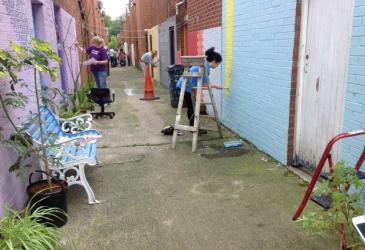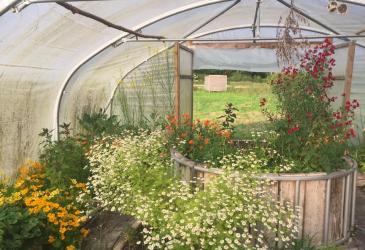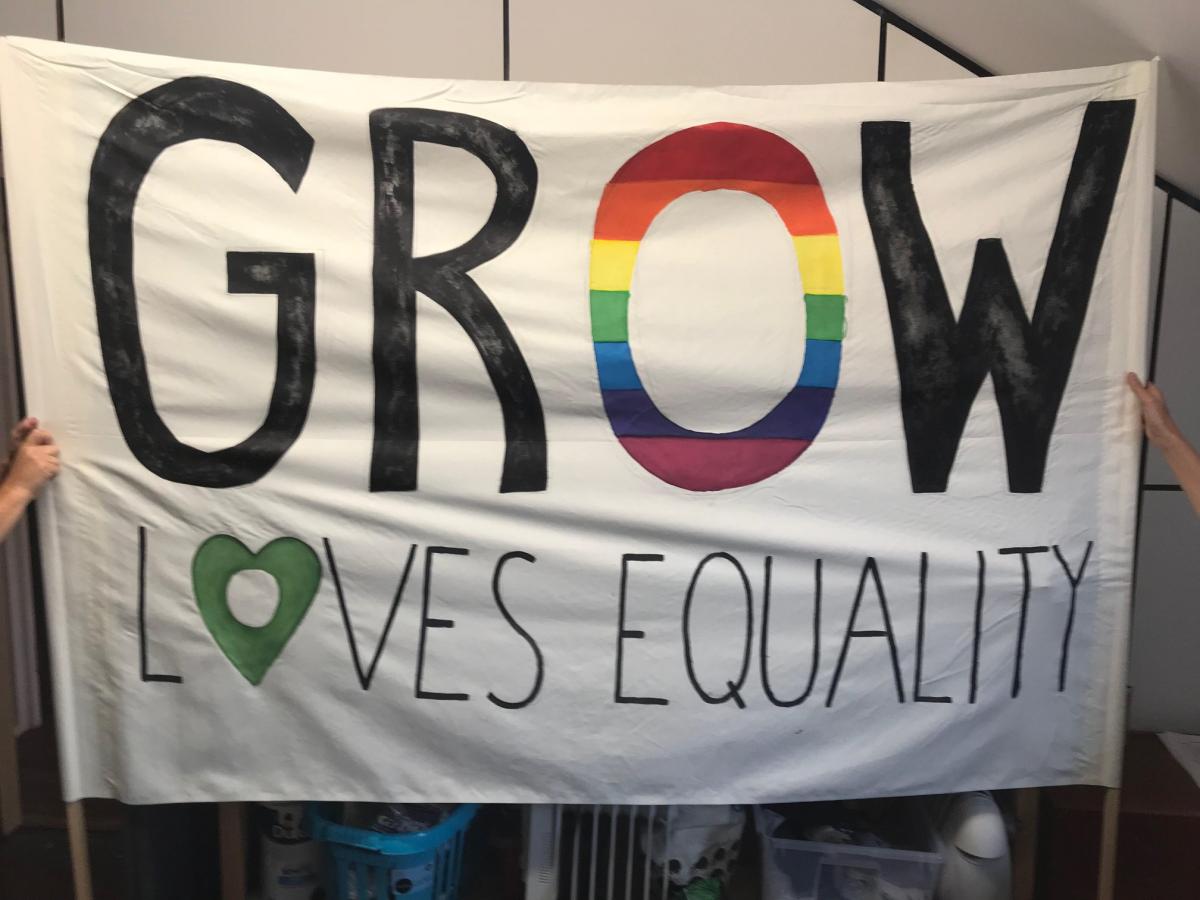
Grow N.I
Geographical Area Covered
Grow is situated in North Belfast with community gardens at the Westland Gardens entrance to the Waterworks and on the Limestone Road in a supported living development run by Newington Housing Association. Visit their Facebook page
The programme
Grow was established by a small group of local residents from North Belfast in October 2008. Their motivation initially was to create a space for people to connect through growing, particularly targeting those who were experiencing mental ill-health. It quickly became clear however that there was interest and a need within the wider community for safe spaces to connect, not just those with mental ill-health.
A lease was obtained from Belfast City Council for a piece of land at the edge of the Waterworks, on a peaceline between Westland Gardens and the Westland Estate and a community garden was established. North Belfast is a community deeply impacted by the Troubles, continuing to be fractured along religious and cultural lines and now adapting to a changing demographic to include refugees, asylum seekers and economic migrants. Grow is committed to effecting social change in this context and we are guided by community development principles of empowerment, social justice and collective actions. In practice what this means is that we ensure that our groups are representative of and actively celebrate the diversity of our community, not just in terms of mental health but also class, religion, gender, sexual identity, ability, race and age.
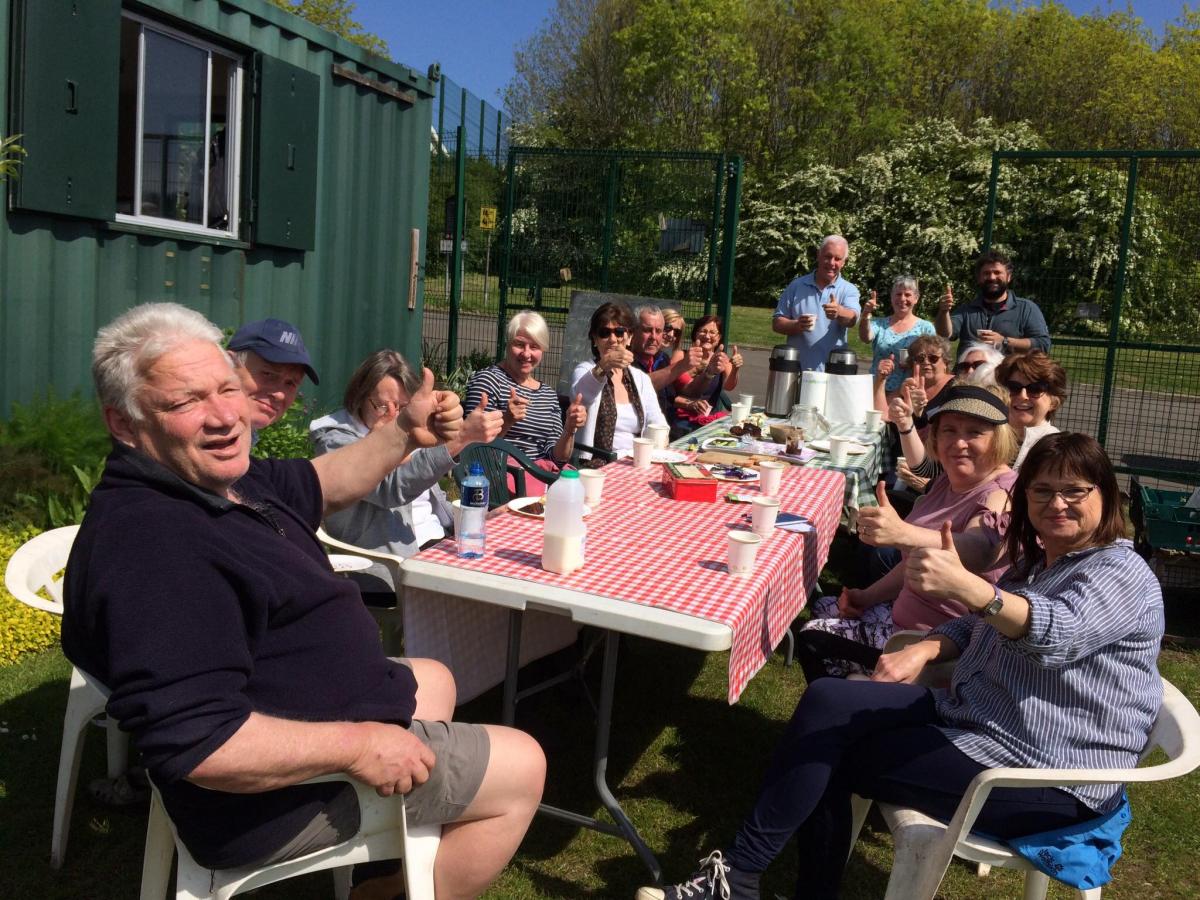
Over the last ten years, three core groups have been established, meeting weekly during the growing season (March – October) including over the holiday period in July. These groups form the core of our membership and it is generally through these groups that our volunteers emerge, having joined initially as participants and been mentored by our Community Gardeners. Some of our volunteers have been with us since the early days and their commitment and sense of ownership over the two gardens is admirable. Volunteers now take a leading role in delivering our core sessions and they in turn are able to mentor new participants into a volunteer role.
Each year we take in new members to each of the core groups, preferably at the start of the season but also throughout the season. Referrals come via partner organisations such as Newington Housing, Newlife Counselling, Jigsaw Counselling, Women’s Tec, the 174 Trust, by word of mouth, through GP surgeries, Social Prescribing, organisations working with refugees & asylum seekers such as Homeplus, North Belfast Friendship Group, South Belfast Friendship Group, Belfast Unemployed Resource Centre and others. Our only criteria is for the person to be living in the area, able to commit for the whole season and a commitment to our core values. Our Tuesday morning group tends to attract people who are retired or semi-retired, out of work or caring for young children. Our Sunday group tends to attract those who are working during the week with some people bringing their families along to these sessions. Our Wednesday morning group meets at Camberwell Court (supported living) and participants are drawn from residents who live there as well as residents in the surrounding Newington Housing Association developments. Both our Tuesday and Sunday groups currently have a waiting list and we continue to receive referrals on a regular basis.
Grow currently has one paid staff (Director) who works 22hrs per week, as well as a sessional Outreach Worker who works on average 16hrs per week and two community gardeners who each work on average 5hrs per week.
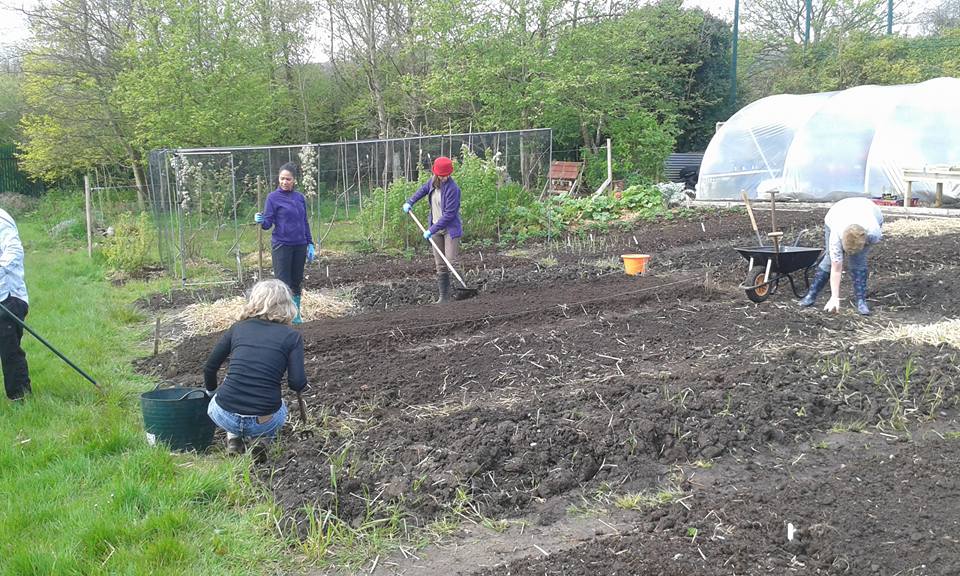
The outcomes
"Grow’s reputation for delivering a sustainable model for community gardens is growing and we receive regular requests from other organisations in Belfast and beyond for support, mentoring and training in setting up a garden using a similar model. Due to our limited resources we are currently unable to provide this support in any formalised way. We receive regular requests from schools, disability groups, mental health organisations, victims & survivors’ groups and others to host gardening and outdoor education & wellbeing sessions for groups. Over the last year we have dipped our toe in the water with this work, doing some outreach work aimed at increasing the range of people and groups utilising our space. We have organised events and programmes aimed at families, children, young people, those with physical and intellectual disabilities, those with mental ill-health, older people, refugees and asylum seekers and local schools.
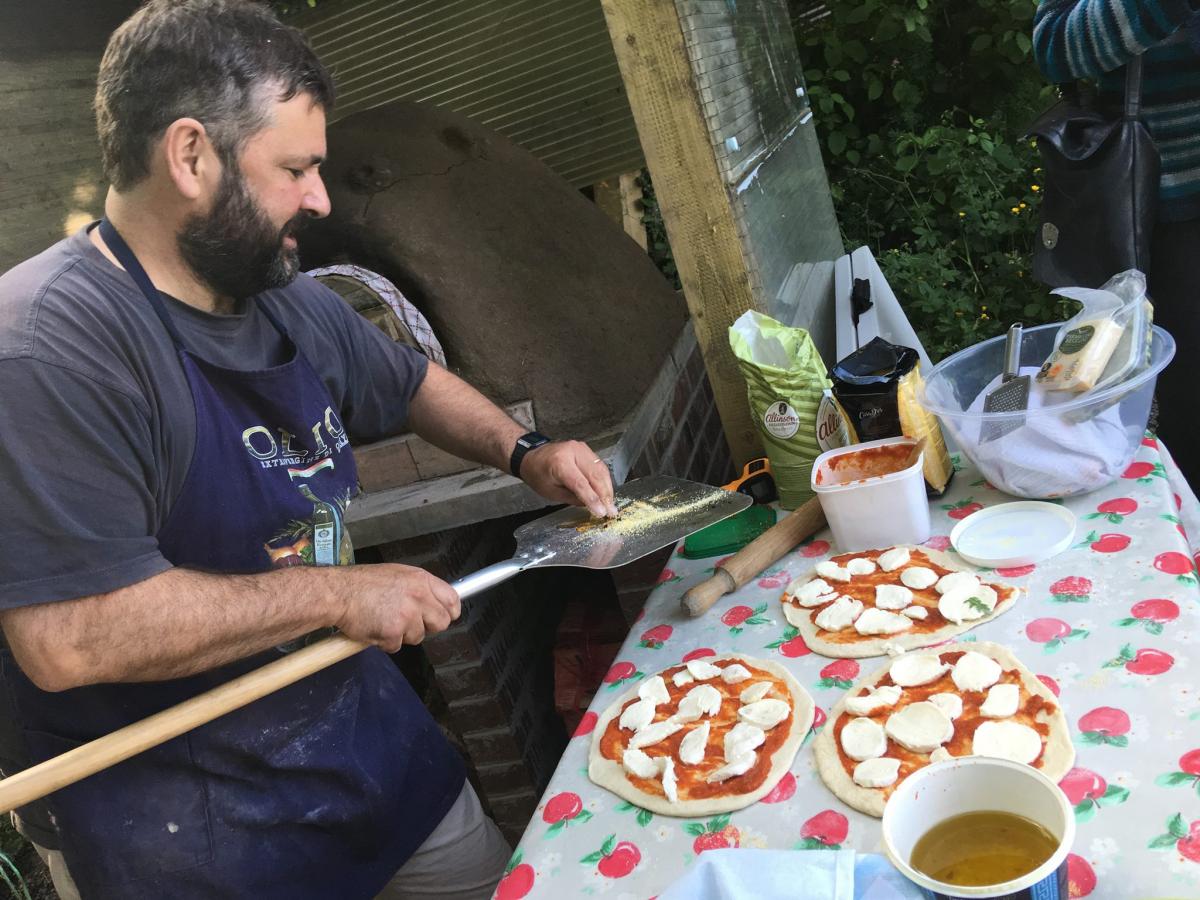
We run wellbeing programmes including Tai Chi, singing and nature-based Mindfulness aimed at the wider community and also promote these programmes to our colleagues in partner organisations as part of a self-care agenda for workers in the community & voluntary sector where burnout is high. We have hosted networking and training events for regional and local organisations including Social Farms & Gardens, the RHS, local youth workers, GIY Ireland, the Repair Café and others. Local therapeutic organisations such as Newlife and Jigsaw have begun to use our space for one-to-one and group therapeutic sessions. Our volunteers built a clay oven at the bottom of the garden in 2018 and it has provided a focal point for many of our events. As well as growing food we are also very interested in cooking and eating it and we host regular cookery sessions at the garden. We support people to eat well on a budget and have developed links with Fareshare to further this work. Last year we brought our older residents in Camberwell Court together with refugee & asylum seeker women from Homeplus for a cookery session and have been able to further develop that work this year.
We are very aware of the health inequalities that exist in our community and aim to address these in practical ways that also allow people to connect.
There appears to be a great appetite for access to a safe outdoor space to run all kinds of events and programmes, alongside our core weekly growing sessions. All of our work benefit people physically by getting them active outdoors. Gardening and nature-based wellbeing activities have well documented outcomes for mental health and emotional wellbeing and our work is no exception. Our core purpose is to bring people together, to tackle social isolation and support the development of friendships that endure long beyond people’s involvement with Grow. We also support people to grow, cook and eat their own food with many of our people using the knowledge they gain at Grow to develop their own garden spaces and those of their friends and families. Some of our volunteers have gone on to gain formal qualifications in horticulture and are now teaching others about growing. We see a multitude of possibilities for developing our work, targeting the most marginalised in our communities and providing opportunities to grow, learn and connect."
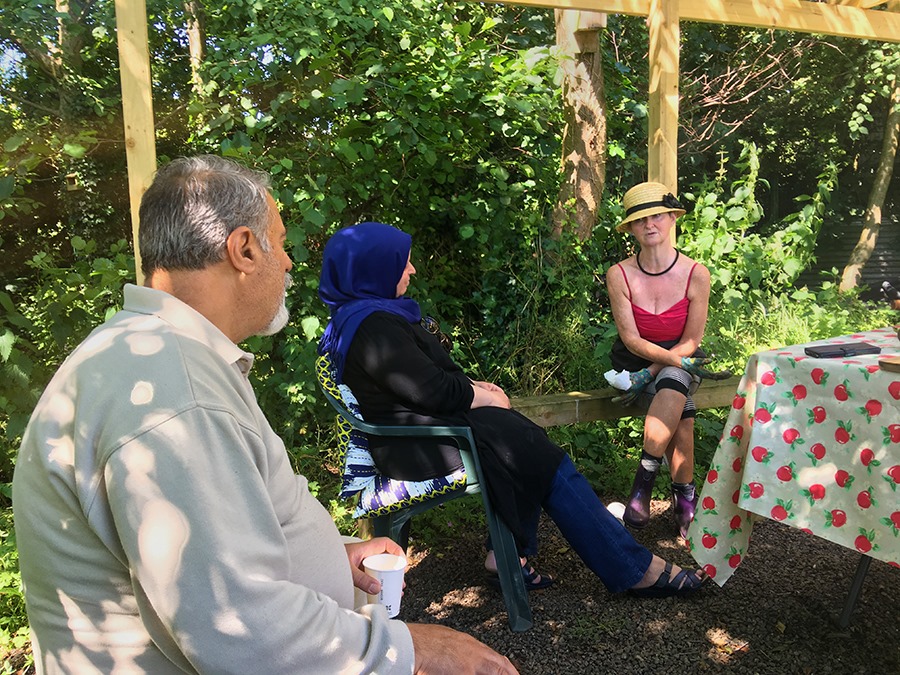
Learning
"We learned early on that people do not want to be labelled. For this reason we changed the way we promoted the project, from a mental health initiative to ‘getting your head showered and getting your hands dirty’. During the years that we were funded to deliver an older people’s project our participants were very clear that they didn’t want to be involved in a project just for older people. Grow made the case to the Lottery for our groups to have a mix of ages and this had ensured the sustainability of those groups in the longer term.
We have learned that key to a successful community garden is a bottom-up participative approach. This has meant that our volunteers and participants have a genuine sense of ownership of the gardens and come up and are involved in the implementation of any new work that we have developed. Without our volunteers Grow would not be able to function.
We have learned that community gardens can act as a springboard for people to get actively involved in their communities. Many participants and volunteers have gone on to get involved in other community-based initiatives and indeed to start their own initiatives. Our garden is a place of tranquillity and safety for many people. Visitors experience the beauty and peace of the space and mistakenly think that it is an easy thing to create. We have learned that there is a great deal of work that happens behind the scenes and that it is challenging to garner the resources to do this work well. Part of our challenge going forward is to continue to build supportive relationships with other organisations including funders."
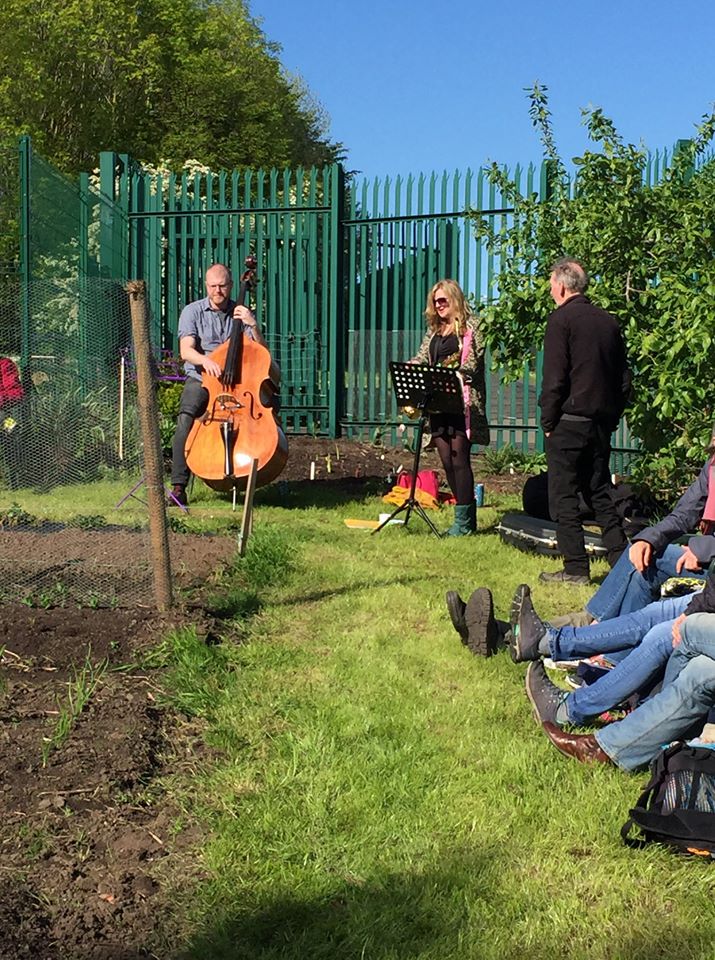
Related Case Studies
Alley Garden in West Belfast - the West Belfast Partnership Board opened the newly greened alleyway behind La Salle Gardens off the Falls Road. The West Belfast Partnership Board (WBPB) teamed up with Springvale Learning to transform the alleyway behind La Salle Gardens adjacent to Willowbank walkway, from a ‘dead space’ into a residential friendly, green area.
Common Ground N.I. has the mission of connecting individuals, groups and communities with nature for the benefit of humanity and for reciprocal benefits to nature.

